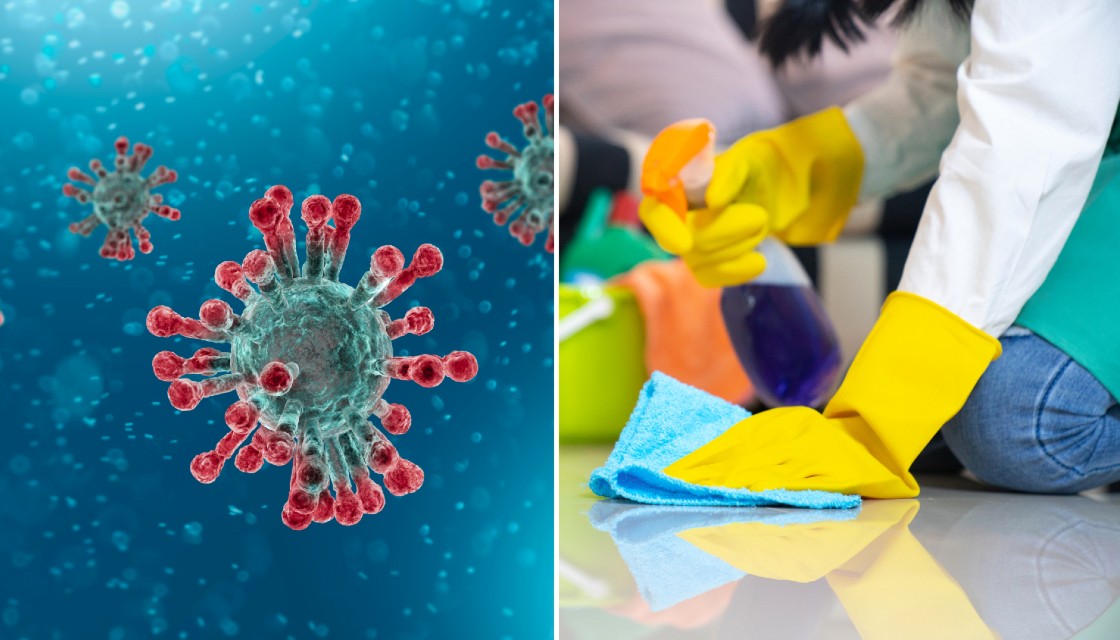With the coronavirus still raging across the world, we should not take ourselves for granted. To be safe is better than being sorry and prevention is the best cure. With the deadly COVID 19 caused by SARs-CoV-2 being so potent and aggressive, the need of the hour is disinfecting not just your hands but all surfaces at work and home.
It is essential to know that not all disinfectants that claim to keep surfaces germ free are useful. There are varieties of germs and viruses, so all of them can’t be killed by just one product. Research confirmed by WHO (World Health Organization) has identified how long the virus lives on what surfaces. In light of this, it becomes easy to distinguish the various disinfectants and their intensity of action against it. This article will let you know the products and a suitable covid cleaner which can specially fight against Coronavirus.
How long does the virus live on surfaces
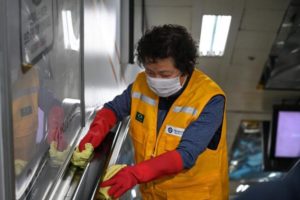
Studies acknowledged by WHO has found out how long the virus stays on these surfaces
- Cloth and wood: 1 day
- Glass: 2 days
- Stainless steel and plastic: 4 days
- Outer layer of a medical mask-7 days
- Copper surfaces: 4 hours
- Cardboard: 24 hours
What kills coronavirus?

A list of products which can fight against viruses like Rhinovirus, flu, etc. has been drawn up by the U.S Environmental Protection Agency, but they haven’t been tested on this new Coronavirus. These products contain varieties of ingredients and formulations so they can be effective on this new virus in some ways. These products can be used according to the guidelines on the labels.
- Clorox Disinfecting Wipes
- Clorox Clean-Up Cleaner + Bleach
- Lysol Disinfectant Spray
- Lysol Multi-Purpose Cleaner with Bleach
- Lysol Multi-Purpose Cleaner with Hydrogen Peroxide
- Purell Multi Surface Disinfectant Spray
- Microban 24 Hour Multi-Purpose Cleaner
To know the full list of EPA approved PRODUCTS that are effective against SARS-CoV-2, CLICK HERE
How to use cleaning products to kill coronavirus
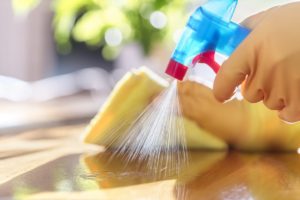
Disinfecting and sanitizing are 2 different methods to keep surfaces germ free The risk of getting illness from germs is reduced to 99.9% after sanitizing as it kills all the germs within 30 to 60 seconds. Disinfecting can take 10 minutes but kills 99.999% germs depending on its strength.
It is essential to know the duration of how long to effectively kill the germs on long hard, non-porous surfaces, but it should be mentioned on the label. You may have to apply the product a few times more so that the liquid can evaporate. A dirty surface cannot adequately be disinfected or sanitized adequately, so it recommended to use plain soap and water before applying the product.
What DIY household cleaner kills coronavirus?

The U.S. Center for Disease Control (CDC) have discovered an easy way of making your own covid cleaner for disinfecting non porous hard surfaces, you require a mixture of 1/3 cup of Chlorine bleach (Sodium Hypochlorite) per a gallon of water. (Clorox advises 1/2 cup bleach per gallon of water). For small batches, 4 tsp of regular chlorine with 1 quarter water.
HOW TO USE: Wipe the surfaces with a cloth dipped in the mixture, remember to wear gloves while doing so and let the solution be in-contact with the surface for at least 5 minutes. Use warm water for rinsing the surfaces like high chair trays, counter tops etc. And let it air dry. Avoid splashing the bleach solution on your clothes or eyes and use a small amount for stainless steel surfaces and basins. A fresh solution of bleach and water is required for cleaning every day.
Does hydrogen peroxide kill viruses and bacteria?
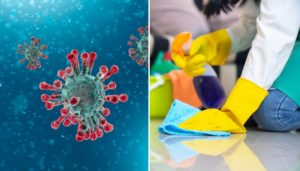
The CDC says hydrogen peroxide can be a stable and effective disinfectant against various bacteria, viruses and micro-organisms when applied on surfaces which are hard and non-porous. They are available in 3% solutions and can be used directly from the bottle. You should avoid contact with any fabric and also protect your hands by using gloves.
HOW TO USE: Wipe or spray the solution on the surface and let it remain wet for at least 1 minute, before you wipe it off.
Will alcohol disinfect surfaces?
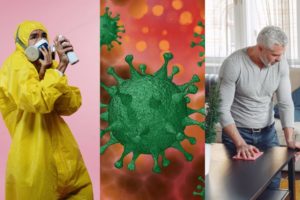
Isopropyl alcohol should have a concentration of more than 70% for it to work as an effective disinfectant against varieties of pathogens and Coronavirus as well. Alcohols which are used for rubbing are usually 70% isopropyl alcohol and they concentration ranges are usually 60-99%. 70% is the ideal concentration as 100% alcohol would evaporate very quickly.
HOW TO USE: Spray or wipe the alcohol on the surface and make sure that it remains wet for 30 seconds.
Can vinegar kill germs?
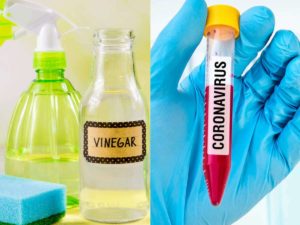
The CDC and NSF (Public health and safety organizations) have stated that vinegar and vinegar based products should not be used as a disinfectant against viruses or for sanitizing and disinfecting surfaces. Cleaning products which contain vinegar can be effective in some instances only, but it isn’t EPA registered as a disinfectant and is ineffective against any viruses and bacteria. Vinegar cannot kill coronavirus, flu or other viruses. White vinegar which isn’t diluted can work against a few types of bacteria but it isn’t an effective way to keep surfaces germ free.
Other information you should know
Water and regular soap can clean germs away and reduce the quantity of germs significantly. This reduces chances of infection. You can kill germs by cleaning surfaces with soap and water first and then sanitizing or disinfecting them.
Avoid mixing, cleaning, and disinfecting products together and if you observe fumes, you should open the windows or doors for ventilation.
Surfaces which are soft and porous can never be completely germ free and disinfected. You can sanitize soft surfaces like plush toys, pillows, cushions, etc. By using antibacterial sprays.
You should test delicate surfaces by applying some hydrogen peroxide, alcohol or any other disinfectant. After disinfecting food, contact surfaces, use water for rinsing and drying them off unless the label mentions that it isn’t necessary.
According to the WHO latest situation report of May 16th 2020, an extensive guide on cleaning and disinfecting recommends the use of Sodium Hypochlorite based products like bleach in various concentrations against COVID 19. However it is recommended to wash surfaces first thoroughly before applying the solution as sodium hypochlorite is inactivated in presence of organic matter like body fluids and blood.
EPA guide for cleaning and disinfecting for COVID 19
EPA list of products effective against viruses
CDC guide for cleaning and disinfecting
WHO guide for cleaning and disinfecting for COVID 19
